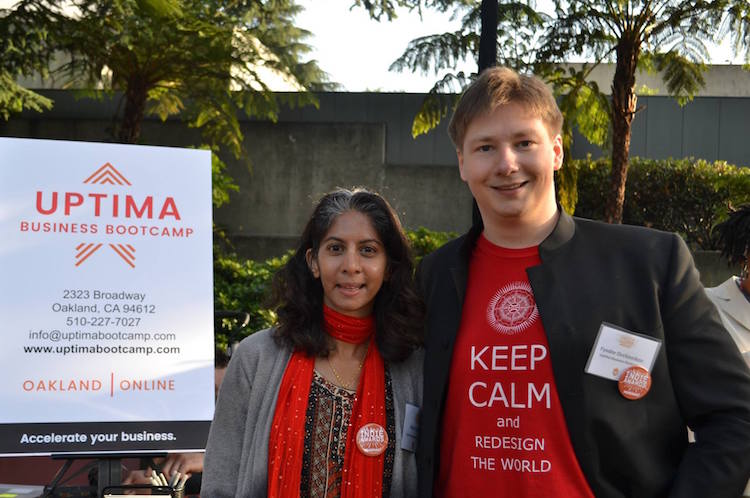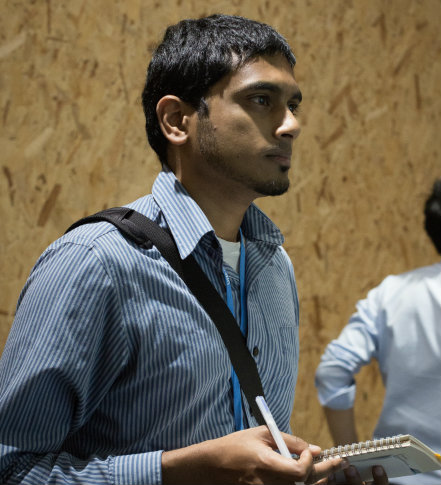On the surface, Uptima Business Bootcamp, based in Oakland, California, sounds like one of the many business accelerators in the San Francisco Bay Area and increasingly, around the world. But dive a bit deeper and you'll find that Uptima is an innovative, multi-stakeholder cooperative that's not only empowering freelancers and enterprises that haven't had access to business resources, but providing a replicable framework to greatly expand cooperative business opportunities across the country.
Since it launched in 2014, Uptima's innovative program has focused on helping build local wealth and creating a community of self-supporting businesses and nonprofits. Uptima programs are open to freelancers, small businesses, and nonprofits. So far, the participants include artists, graphic designers, organic care producers, and even operators of a tech-based delivery platform.
We sat down with the founder of Uptima, Rani Langer-Croager, at the organization's office at Impact Hub Oakland, to learn more about how they are empowering a very different community of businesses and nonprofits.
Nithin Coca, Shareable: Can you tell me a bit about your background, and the story of Uptima – where did the idea come from?
Rani Langer-Croager, Uptima Business Bootcamp: I grew up around cooperative economics. With two children in the family, my mom took on micro-entrepreneurial activities, and one of those was banding together with the lady down the street … to clean people's houses. So fast forward a few years, and I went to a great college and racked up a tremendous amount of student debt. I came out looking to get out of some of that debt with the intention of doing something more noble. The only way to get out of that debt for me was to take one of those jobs that paid a decent amount of money, and at the time was investment banking. I did mergers, acquisitions, financing for a big corporation and learnt a lot about the system, but in the back of my mind I had this idea that I would get out and do something that would have a lot more social impact. During the mortgage downturn I had a good opportunity to do that.
So I ended up getting connected with an entrepreneur who was starting a nonprofit/for-profit joint venture to create a community college alternative — a cooperative college where the students could be owners and the investors could also be owners. We were able to get a letter of intent from a couple of colleges to acquire and convert them into this cooperative structure. We went down the pathway of trying to raise money for that. Raising money for a cooperative is a challenge because there's not a lot of capital sources. Either because of the type of returns expectation they had, or the governance, all our potential funders said no.
There's two types of traditional types of entrepreneurship programs – the nonprofit model, where you are scrambling around for grant money and federal dollars that are being cut year after year. Then, there were these for-profit models like seed equity accelerators that were taking significant percentage of the company through an equity investment.
So this left a lot of people out and so that's why I said – I'm going to do this … and disrupt that system. And if we're going to talk about entrepreneurship as a means for wealth creation, then why shouldn't the entrepreneurs actually own the program that they go through? It compounds wealth creation – not only do they own their business, but they own the accelerator too, so they get returns from that as well.
How does Uptima work, and what have been some of the challenges you faced since you started? I imagine it's not easy setting up something that's never been done before.
We have several ways that we work with people. We have a freelancer program that's a six-week long program, for people who want to be self-employed in personal or professional services industry. The other program is a small business and enterprise accelerator. And here we work with early-stage businesses in that program for up to a year depending on what stage they're at. In that, we have four 12-week modules.
One of the challenges is that creating a cooperative takes a lot of capacity building. There's this tendency in our society to want a quick fix to something. And that quick fix could be like a technological solution like let's go code a program … It's an easy model to market and to sell. A cooperative is a much longer term economic development strategy.
We've been running really lean and during our first cohort I was doing everything: marketing, enrollment teaching, mentoring. But we slowly have been able to build capacity through the membership and the cooperative.
The language you use to kind of describe yourself, such as a business bootcamp or accelerator, are the same terms you see among traditional, VC-backed accelerators. Why did you choose that messaging?
When we first started out I tested a message of, "We're a cooperative business accelerator. And that would get a lot of different reactions like 'what's a cooperative' or 'you know I had an experience with a co-op that I didn't like' or 'why would I want to share?'" That's why we landed on the message of member-owned to start with, so that we can ease into the conversation about cooperatives. What we recognized in those early conversations is that people didn't understand the concept, or the economic value of a cooperative. So we needed to bridge that language.
You know, these businesses that we support at the very micro stage. As they start to think about bringing on employees, maybe they will want to form as a worker-owned cooperatives, or some of the technology companies might want to become platform cooperatives. But if we hit people with this in the beginning, they get confused and they might get turned off.
It's definitely different for every member in terms of how they approach it in their own business. We ask questions and in our admission process around how do you feel about our cooperative structure. A lot of times what I'll get is, "well I'd like to learn more about that," and then that gives us an opening to have a conversation. Well here's what that means – you have the opportunity to own the accelerator. And then they're like, "whoa, that's pretty cool," and then they want to see how they could make that work.
Can you tell me about some of the people and businesses who have gone through your program?
In our freelancer class, we've worked with a range of people. In the professional services, consultants who work with nonprofits, graphic designers, web developers. etc. In personal services we've worked with health and wellness professionals coaches, makeup artists, hairdressers, and then we've also worked with artists including visual artists, musicians, and writers.
Wow, really diverse.
Yes, and we want to put them in the class together because they learn different aspects of business from each other, and also make connections and create community that helps each other out.
One freelancer was MJ Lee dot, a Asian-American musician who started off playing violin. Didn't really think that music could be a career pathway, but now she's an independent solo artist. She does violin at weddings, and she's got her first album and music video out. Another freelancer that we've worked with is a guy named James Shields. He's a visual artist. He does murals here in Oakland, teaches art lessons, and does creative branding for small businesses and other organizations.
On the small business side, we work small local businesses — people who want to start brick and mortar stores, or they might also be in service-based businesses to all the way up through tech startups that want to be global in nature. We also can take in nonprofits. They just can't become members of the co-op.
One of the organizations that we've worked with here are ProfHire, a platform for people who want to be part-time professors at colleges and universities.
Just from those few examples, it sounds like you have diverse candidates going through your program.
Yes, definitely. Statistically, our program is 70 percent to 80 percent women, about 60 percent people of color, and probably about 55 percent people from low to moderate income backgrounds.
That's really great to hear. So, my last question — what's next for Uptima? How do you plan to keep growing your community and increasing your impact?
We're a learning organization. Because of the co-op structure, we constantly get feedback from people. Because the structure itself incentivizes people to be engaged in the community.
Earlier this year, we decided to test a replication of Uptima Oakland and opened up a location is San Francisco, in deep partnership with Impact Hub San Francisco. The San Francisco cooperative is our prototype of replication. We have started running classes there, we had eight freelancers that graduated earlier this month, and we will start adding our small business program next year. Our idea is that we want to then work with groups and other cities, to create place based co-ops with the Uptima brand, model and curriculum, a network of co-op business accelerators.
Header image of Rani Langer-Croager (L), courtesy of Uptima Business Bootcamp









